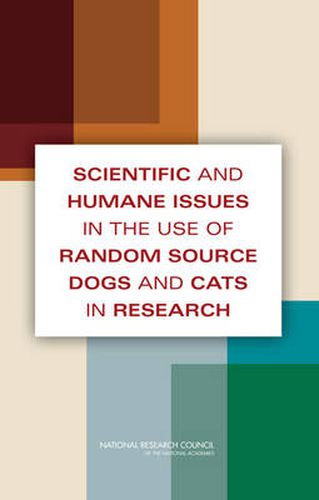Readings Newsletter
Become a Readings Member to make your shopping experience even easier.
Sign in or sign up for free!
You’re not far away from qualifying for FREE standard shipping within Australia
You’ve qualified for FREE standard shipping within Australia
The cart is loading…






Scientific and Humane Issues in the Use of Random-Source Dogs and Cats in Research examines the value of random source animals in biomedical research, and the role of Class B dealers in supplying those animals. Findings include that, while random source dogs and cats may be necessary and desirable for NIH-funded research, there is no clear need to obtain those animals from Class B dealers. Several alternative options for random source animal acquisition are recommended, which would further ensure the welfare of these animals, and foster a positive public image for NIH. This book will be crucial for the NIH and other groups using random source animals in research, including veterinary schools and research facilities. Animal welfare advocates, policy makers, and concerned pet owners will also find this a vital and informative work for reconciling the needs of research with the welfare of animals. While the scientific community has recognized and responded to concerns for the humane treatment of animals in research, it has thus far been unable to prevent abuses by Class B dealers of live animals, who acquire and resell live dogs and cats to research institutions. Although the animals acquired by Class B dealers are destined for research–and National Institute of Health (NIH) research in particular–the standard of care is severely lacking when compared to the policies of most research laboratories. This dichotomy of standards reflects poorly on public perceptions of NIH and jeopardizes animal welfare.
$9.00 standard shipping within Australia
FREE standard shipping within Australia for orders over $100.00
Express & International shipping calculated at checkout
Scientific and Humane Issues in the Use of Random-Source Dogs and Cats in Research examines the value of random source animals in biomedical research, and the role of Class B dealers in supplying those animals. Findings include that, while random source dogs and cats may be necessary and desirable for NIH-funded research, there is no clear need to obtain those animals from Class B dealers. Several alternative options for random source animal acquisition are recommended, which would further ensure the welfare of these animals, and foster a positive public image for NIH. This book will be crucial for the NIH and other groups using random source animals in research, including veterinary schools and research facilities. Animal welfare advocates, policy makers, and concerned pet owners will also find this a vital and informative work for reconciling the needs of research with the welfare of animals. While the scientific community has recognized and responded to concerns for the humane treatment of animals in research, it has thus far been unable to prevent abuses by Class B dealers of live animals, who acquire and resell live dogs and cats to research institutions. Although the animals acquired by Class B dealers are destined for research–and National Institute of Health (NIH) research in particular–the standard of care is severely lacking when compared to the policies of most research laboratories. This dichotomy of standards reflects poorly on public perceptions of NIH and jeopardizes animal welfare.